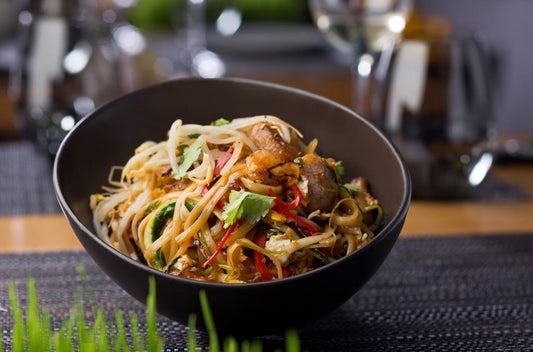
Incorporating Pure Mustard Oil into a Mediterranean Diet: A Fusion of Flavors and Health Benefits
The Mediterranean diet has long been celebrated for its health benefits and delicious flavors. Known for its emphasis on plant-based foods, healthy fats, and moderate consumption of lean proteins, this dietary pattern has been associated with numerous health advantages, including reduced risk of heart disease, improved cognitive function, and increased longevity. While olive oil is traditionally the cornerstone of Mediterranean cuisine, there's an intriguing newcomer on the scene that's catching the attention of health-conscious food enthusiasts: pure mustard oil.
Mustard oil, extracted from mustard seeds, has been a staple in Indian and Bengali cuisine for centuries. Its distinctive pungent flavor and potential health benefits make it an exciting addition to the Mediterranean diet. In this blog post, we'll explore how you can incorporate pure mustard oil into your Mediterranean-inspired meals, creating a unique fusion of flavors and potentially enhancing the already impressive health profile of this popular dietary pattern.
Understanding Mustard Oil
Before we delve into the ways to use mustard oil in Mediterranean cooking, it's important to understand what makes this oil unique. Pure mustard oil is characterized by its strong, sharp aroma and slightly spicy taste. It's rich in monounsaturated and polyunsaturated fats, including omega-3 fatty acids, and contains high levels of erucic acid, which has been a subject of both praise and concern in the scientific community.
It's worth noting that in some countries, including the United States, pure mustard oil is sold for external use only due to its high erucic acid content. However, in many parts of the world, it's widely used in cooking and is considered safe when consumed in moderation as part of a balanced diet. As with any dietary change, it's advisable to consult with a healthcare professional before incorporating mustard oil into your regular cooking routine.
Complementing Mediterranean Flavors
The bold flavor profile of mustard oil can complement many Mediterranean dishes, adding a new dimension to familiar recipes. Here are some ways to incorporate it into your Mediterranean-inspired meals:
1. Dressings and Marinades: Mix mustard oil with lemon juice, garlic, and herbs to create zesty dressings for salads or flavorful marinades for grilled vegetables and lean meats.
2. Sautéing and Stir-frying: Use mustard oil to sauté vegetables or create quick stir-fries, infusing your dishes with a subtle peppery note.
3. Dips and Spreads: Add a small amount of mustard oil to hummus or baba ganoush for an extra kick that complements the creamy textures of these Mediterranean staples.
4. Finishing Oil: Drizzle a small amount of mustard oil over finished dishes like grilled fish, roasted vegetables, or grain-based salads to add depth and complexity to the flavors.
Health Benefits of Combining Mustard Oil with Mediterranean Foods
Incorporating mustard oil into a Mediterranean diet may offer additional health benefits beyond those already associated with this eating pattern. Here are some potential advantages:
1. Heart Health: Both the Mediterranean diet and mustard oil are known for their potential cardiovascular benefits. The combination of omega-3 fatty acids from fish and plant sources, along with the monounsaturated fats in mustard oil, may further support heart health.
2. Anti-inflammatory Properties: Mustard oil contains compounds that have been shown to have anti-inflammatory effects. When combined with the antioxidant-rich foods typical of the Mediterranean diet, this could potentially enhance the overall anti-inflammatory benefits.
3. Digestive Health: The pungent compounds in mustard oil may stimulate digestive enzymes, potentially aiding in digestion when consumed alongside the fiber-rich foods common in Mediterranean cuisine.
4. Balanced Omega-3 to Omega-6 Ratio: While the Mediterranean diet is already known for its favorable omega-3 to omega-6 ratio, the addition of mustard oil, which is rich in both these essential fatty acids, may help maintain this balance.
Recipe Ideas: Mediterranean-Mustard Oil Fusion
To help you get started with incorporating mustard oil into your Mediterranean-inspired cooking, here are a few recipe ideas:
1. Mediterranean Mustard Vinaigrette:
- 2 tablespoons mustard oil
- 1 tablespoon red wine vinegar
- 1 teaspoon Dijon mustard
- 1 clove garlic, minced
- Salt and pepper to taste
Whisk all ingredients together and use as a dressing for mixed greens or as a marinade for grilled vegetables.
2. Mustard Oil-Infused Hummus:
Add a teaspoon of mustard oil to your favorite hummus recipe for a spicy twist on this classic Mediterranean dip.
3. Mustard Oil Ratatouille:
Sauté traditional ratatouille vegetables (eggplant, zucchini, bell peppers, and tomatoes) in a mixture of olive oil and mustard oil for a fusion take on this Provençal dish.
4. Grilled Fish with Mustard Oil and Herbs:
Brush a mixture of mustard oil, lemon juice, and Mediterranean herbs (like oregano, thyme, and rosemary) onto fish fillets before grilling.
5. Precautions and Considerations
While incorporating mustard oil into a Mediterranean diet can offer exciting culinary possibilities and potential health benefits, it's important to keep a few things in mind:
1. Moderation is Key: Due to its strong flavor and high erucic acid content, mustard oil should be used in moderation. Start with small amounts and adjust to taste.
2. Quality Matters: Choose high-quality, pure mustard oil from reputable sources. Look for cold-pressed or expeller-pressed varieties for maximum nutritional benefits.
3. Heat Sensitivity: Mustard oil has a high smoke point, making it suitable for high-heat cooking. However, to preserve its nutritional properties, it's best used in low to medium-heat cooking or as a finishing oil.
4. Allergies: Those with mustard allergies should avoid mustard oil.
5. Pregnancy and Breastfeeding: Pregnant and breastfeeding women should consult their healthcare provider before using mustard oil in cooking.
Incorporating pure mustard oil into a Mediterranean diet offers an exciting opportunity to explore new flavors and potentially enhance the health benefits of this already nutritious eating pattern. By thoughtfully combining the principles of Mediterranean cuisine with the unique properties of mustard oil, you can create a fusion of tastes that tantalizes the palate while supporting overall well-being.
Remember, the key to any healthy diet is balance and variety. While mustard oil can be a flavorful and potentially beneficial addition to your Mediterranean-inspired meals, it should be part of a diverse array of healthy fats, including the traditional olive oil, nuts, and fatty fish that are cornerstones of this dietary pattern.
As you experiment with mustard oil in your Mediterranean cooking, you'll discover new flavor combinations and culinary techniques that can breathe fresh life into familiar dishes. Embrace this fusion of culinary traditions, and enjoy the journey of creating delicious, healthful meals that bridge cultures and excite your taste buds.
Continue reading
View all-

The Twin Temptation: Bakers Frappe Powder for Your Cafe-at-Home Moments
Are you tired of spending a fortune at coffee shops to get that perfect frappe? What if you could recreate that creamy, smooth, and delicious experience right in your own...
The Twin Temptation: Bakers Frappe Powder for Your Cafe-at-Home Moments
Are you tired of spending a fortune at coffee shops to get that perfect frappe? What if you could recreate that creamy, smooth, and delicious experience right in your own...
-

Spice Up Your Plate: The Golden Touch of Puress Cold Pressed Mustard Oil!
Puress Cold Pressed Mustard Oil can transform a dish with its unique flavor profile. Try it now!
Spice Up Your Plate: The Golden Touch of Puress Cold Pressed Mustard Oil!
Puress Cold Pressed Mustard Oil can transform a dish with its unique flavor profile. Try it now!
-






